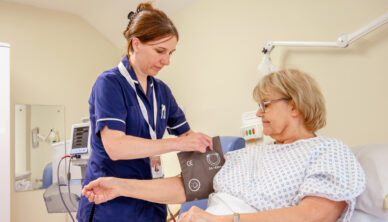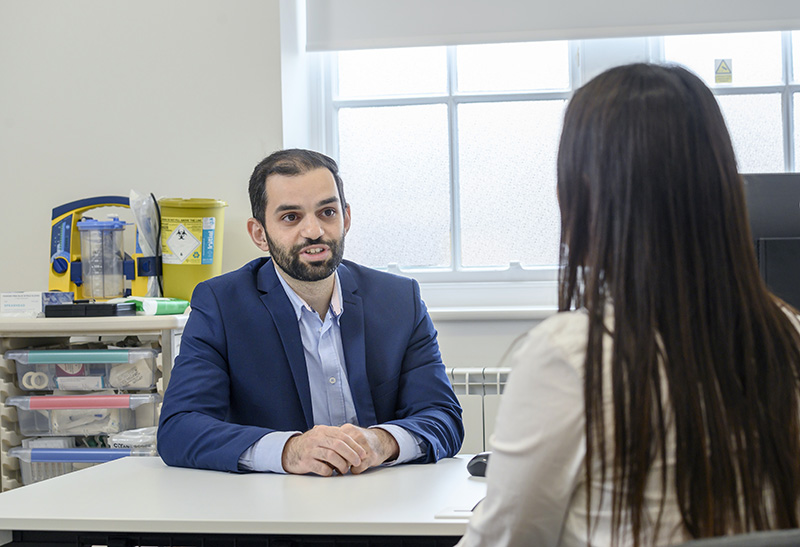Contents
Hypertension

Hypertension (high blood pressure) is a common but serious condition that increases the risk of heart disease, stroke, and other complications.
What is Hypertension?
Hypertension occurs when the force of blood against the artery walls is consistently too high, putting extra strain on the heart and blood vessels. Over time, this can lead to serious health problems, including heart attacks, strokes, kidney disease, and vision loss.
Blood pressure is measured in millimeters of mercury (mmHg) and is recorded as systolic pressure / diastolic pressure (e.g., 120/80 mmHg).
Hypertensive crisis: Over 180/120 mmHg – Requires immediate medical attention
Normal blood pressure: Below 120/80 mmHg
Elevated blood pressure: Between 120-129/less than 80 mmHg
Stage 1 hypertension: Between 130-139/80-89 mmHg
Stage 2 hypertension: 140/90 mmHg or higher
Signs & Symptoms
Hypertension is often called the “silent killer” because it rarely causes noticeable symptoms until serious complications arise. However, some people may experience:
- Headaches – Persistent or severe headaches
- Dizziness – Feeling lightheaded or faint
- Blurred Vision – Changes in eyesight or difficulty focusing
- Chest Pain – Pressure or discomfort in the chest
- Shortness of Breath – Difficulty breathing, especially during activity
- Nosebleeds – Frequent or unexplained nosebleeds
- Fatigue – Feeling excessively tired or weak
If you experience sudden chest pain, difficulty breathing, or confusion, seek emergency medical attention immediately.
Potential Causes & Risk Factors
Several factors can contribute to high blood pressure, including:
- Genetics – A family history of hypertension increases risk
- Unhealthy Diet – High salt, processed foods, and excessive sugar intake
- Lack of Exercise – Sedentary lifestyle weakens the cardiovascular system
- Obesity – Excess weight puts extra strain on the heart
- Smoking & Alcohol Consumption – Damages blood vessels and raises blood pressure
- Chronic Stress – Increases adrenaline and blood pressure over time
- Kidney Disease & Hormonal Disorders – Can contribute to hypertension
- Aging – Risk increases as arteries naturally stiffen with age
- Diabetes – Can lead to damaged blood vessels and increased blood pressure
Diagnosis
Hypertension is diagnosed using a blood pressure test, typically taken over multiple readings to ensure accuracy. At Royal Buckinghamshire Hospital, we offer:
- 24-Hour Ambulatory Blood Pressure Monitoring (ABPM) – Continuous monitoring to assess variations in blood pressure
- Home Blood Pressure Monitoring – Assessing blood pressure over time outside of clinical settings
- Blood Tests & Urinalysis – Identifying underlying conditions contributing to high blood pressure
- ECG (Electrocardiogram) – Checking heart rhythm and function
- Echocardiogram – Assessing heart structure for hypertension-related damage
Treatment Options
Managing high blood pressure is essential to reducing the risk of complications such as heart attacks, strokes, and kidney disease. Treatment options include:
Lifestyle Changes
- Healthy Diet (DASH Diet) – Reducing sodium intake and eating more fruits, vegetables, and whole grains
- Regular Exercise – At least 150 minutes of moderate physical activity per week
- Weight Loss – Reducing excess weight can significantly lower blood pressure
- Quitting Smoking – Improves heart health and reduces complications
- Limiting Alcohol & Caffeine – Reducing intake to prevent blood pressure spikes
- Stress Management – Practicing relaxation techniques like yoga and meditation
Medications for Hypertension
In some cases, lifestyle changes alone may not be enough, and medications are prescribed to help lower blood pressure. These include:
- Diuretics – Help reduce fluid buildup, lowering blood pressure
- Beta-Blockers – Reduce heart rate and workload on the heart
- ACE Inhibitors & ARBs – Help relax blood vessels to improve circulation
- Calcium Channel Blockers – Prevent artery narrowing and improve blood flow
Our cardiologists will determine the most effective treatment plan based on your individual health needs.
Monitoring and Long Term Management
Managing coronary artery disease requires regular check-ups and ongoing care. At The Royal Buckinghamshire Hospital, we Hypertension requires regular monitoring to prevent complications. At The Royal Buckinghamshire Hospital, we can provide:
- Ongoing Blood Pressure Assessments – Routine monitoring to track progress
- Medication Adjustments – Ensuring the best treatment plan for you
- Lifestyle Coaching – Nutritional advice and exercise recommendations
- Cardiac Screening – Identifying early signs of heart disease
Regular check-ups with a cardiologist are essential to maintaining optimal blood pressure levels and reducing long-term health risks.
Arranging To Visit A Private GP

At Royal Buckinghamshire Hospital, we provide fast diagnosis, expert treatment, and ongoing care to support recovery and reduce future risk. Make an appointment with one of our private GPs who can refer you to our specialist cardiologist. Appointments are available to everyone and can often be booked for the same day. There is no need to be registered with our The Royal Buckinghamshire Hospital, or live locally.
If you have insurance which covers a GP visit, we can in most cases invoice the insurer directly. Where you are paying directly, the cost for a 30 minute consultation is £100.
Any additional costs will always be discussed. They could apply if you are referred for an MRI scan, or to a consultant, or for other agreed decisions to support your health.
Our Resident Private GP
Dr Chamali is welcoming and highly experienced. He offers his patients sound diagnosis and treatment, along with individual care focused on their future health.
25 March 2025




